A selection of case studies where NetWatch provided key evidence in hearing loss claims.
How NetWatch can aid with hearing loss claims
In our experience most types of injury claims are for physically apparent ailments; these tend to be easily identifiable in OSINT investigations. The validity of the claim is usually clear based on the types of activities the claimant can be found to be engaging in. But what if the claim was for something that isn’t visibly apparent? At NetWatch we pride ourselves on our ability to deliver thorough investigations and compile comprehensive reports for our clients that present the objective truth. This expertise extends to investigations for occupational health-based claims, such as hearing loss.
We have found that our investigations frequently uncover evidence that strengthens cases against these types of claims, whether they are posts showing the claimant was able to return to work, their ability to enjoy a music festival or other loud social event or even just uploads made by the claimant describing how their injuries were not as severe as they made out to their insurer!
Below are three examples where our Internet Profile service provided key evidence in demonstrating how claimants exaggerated their claims, and even caused the degradation of their hearing to be accelerated!
Case Study #1
This example of an occupational health-based claim comes from an investigation we carried out on an individual who had claimed for a loss of hearing, after being exposed to excessive noise during his employment.
We undertook a full intel-sweep upon the claimant, gaining an understanding of his lifestyle prior to his employment and how it had changed following the alleged damage to his hearing. We found that prior to the hearing loss the claimant was a member of a band and enjoyed performing music.

Our searches then revealed that despite the alleged hearing loss the claimant stated had been caused by his employment, he was able to continue his interest in music and remained a member of his band, frequently attending musical events where he would perform.
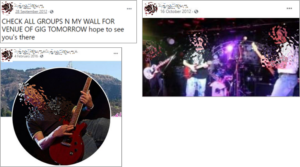
The results obtained in our investigation successfully proved the claimant had been fundamentally dishonest in how his lifestyle had been affected by a loss of hearing, as well as showing that his lifestyle outside of his employment also placed him in an environment where excessive noise would be a common occurrence.
Case Study #2
Another investigation we undertook involved a claim for hearing degradation that occurred over the course of decades during his employment in the building industry, with the use of several machines causing damage to the claimant’s hearing. Due to the claimant’s time of employment occurring before social media was even a concept, any posts identified relating to the claimant were relevant to the case.
Analysis of the claimant’s accounts provided key insights into his lifestyle almost 30 years following the start of his hearing loss, with the analysis revealing the claimant had a continued interest in attending music festivals, enjoying these events despite any additional damage they may have been causing to his hearing. Moreover, the evidence of him attending multiple events in which the ability to hear would be essential to his enjoyment potentially showed his hearing degradation was not as severe as initially claimed.

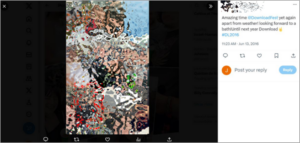
As our investigation went on, further evidence of the claimant partaking in activities where loud noise would be unavoidable was discovered. Notably, the claimant had attended a helicopter trip with his family, during which he would have been subjected to the loud noises of the helicopter, providing our client with further evidence of how his own actions may have played a role in the increased degradation of his hearing.
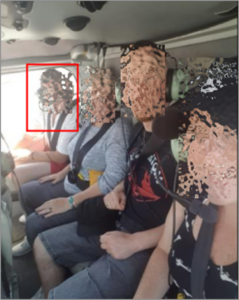
Cast Study #3
Our final case study involves another claim in which it is alleged that excessive noise in the workplace led to hearing loss. Of further note is that the claimant also worked at his own taxi and coach hire business alongside this, and then sought further employment at another coach hire business. Our investigation confirmed the claimant had been able to continue in these roles as the insurer suspected.
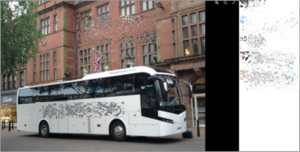
This is not damning in of itself but further analysis of the claimant’s social media accounts also uncovered evidence of continued work with other kinds of automotive vehicles, notably loud farming equipment such as tractors. We were able to locate videos uploaded by the claimant showing him operating a tractor, the audio of which proved to be very loud, confirming to the insurer that any hearing degradation the claimant may have experienced would have been exacerbated by his subsequent employment.
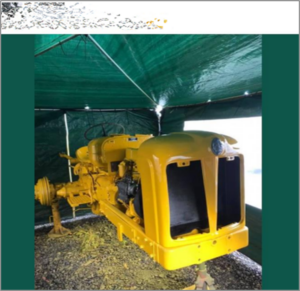
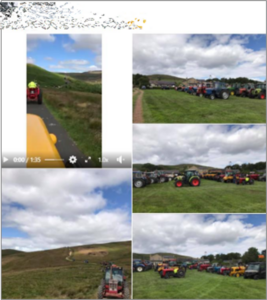
Towards the end of this investigation, we also uncovered an upload revealing the claimant operating heavy vehicles such as HGVs and construction apparatus like excavators, demonstrating his continued involvement in work that would have situated him in high noise environments.
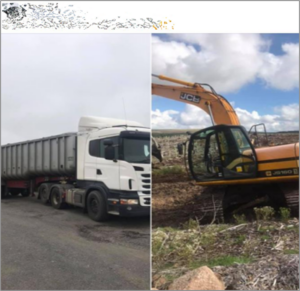
Evidence such as this can help negate the cost incurred by fraudulent hearing loss claims, with studies showing that these types of claims have cost insurance companies £26m in a single year, with individual cases being previously awarded between £3,000 and £5,000[1]. Of note, there were an estimated 11,000 “prevalent” cases of hearing problems caused by employment during 2019-2022[2], assuming each case were to be awarded £3,000, that totals a staggering £33m of compensation.
Whilst not all our investigations uncover such overt evidence as shown in the discussed case studies, if their lifestyles include high-noise hobbies, attendance of public events such as concerts or any other form of activity that may impact their hearing – we will find it. Shedding light on a claimant’s lifestyle is what we do.
Get in touch for more information
If you have had similar claims based on noise-induced hearing loss, NetWatch can help you uncover key evidence to help you assess the validity of a claim. Contact us now at marketing@netwatchglobal.com if you are interested in learning more about how NetWatch Global can assist you in investigating these types of claims.
[1] https://www.independent.co.uk/news/uk/crime/deaf-workers-accused-of-new-whiplash-claims-in-insurance-fraud-9616919.html
[2] https://www.hse.gov.uk/statistics/causdis/deafness/index.htm
The UK’s most trusted open source and social media investigations company. Get the best intelligence available.
© 2025 NetWatch Global Limited - enquiries@netwatchglobal.com
